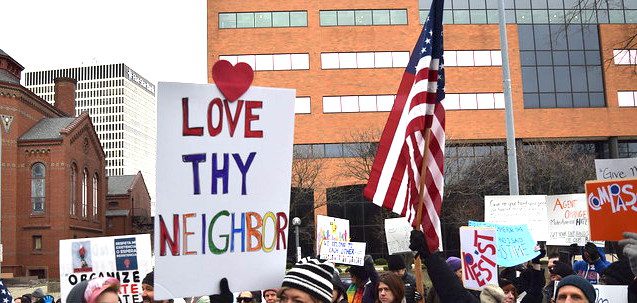
Syracuse, New York, is going all in on housing stability. The city’s 11 different initiatives include an eviction-prevention case management program piloted with the Housing Authority and one Section 8–assisted development that is associated with a 75 percent drop in public housing eviction filings and changes in the housing authority’s internal approach to late payments. Another initiative is support for the creation of a tenant union that will advocate not only for individual tenants, but for policy change such as “advocate for just cause eviction!’” We like this. Organized people are good for democracy.
They aren’t progressive tax reform , but there are a few bills in Congress that would provide some support for financial well-being, including one to expand the Earned Income Tax Credit.
In Miami’s Little Haiti, before developers can stamp a trendy new vibe on their neighborhood, two women artists have embarked on a preemptive-branding project that helps to further cement the neighborhood’s Black and brown, Haitian, and immigrant roots. Taking a cue from a marketing tool used in money-making ventures, this public work and subsequent photographic archive will use umbrellas designed in the colors of the Haitian flag and with a Creole proverb, and will be placed in areas throughout the neighborhood. The artists hope that the project will get residents talking and be a reminder to local officials that the community is worth investment simply for the sake of its residents.
#DontMuteDC. In neighborhoods undergoing change, a common fear of longtime residents is that newcomers will impose certain behaviors and/or employ law enforcement to get involved in situations that make them uncomfortable (see attempts to silence a Harlem drum circle, “BBQ Becky,” and “Cornerstone Caroline”). Residents in Washington, D.C.’s Shaw neighborhood recently created a petition that garnered over 72,000 signatures to protect the playing of Go-go music, a genre of African-American music with D.C. roots, from a storefront located at an intersection where its been played for many years. Complaints about the music allegedly came from a luxury development nearby, and the store manager had been instructed to discontinue its playing. But petitioners won, the music is back on, and the action has spurred a larger organizing effort.
Not today, loan sharks. Advocates in Indiana are celebrating the defeat of a bill that would have drastically raised the interest rates that could be charged on short-term loans. Though the bill passed in the state’s Senate, it wasn’t brought up for a vote in the House because supporters didn’t expect it would pass.
Opportunity Zones, clarified (somewhat). Input time. Some long-awaited guidance on how Opportunity Zones will work has been released recently, though reporting requirements are not yet out. Also, HUD has put out a request for comment on how the agency should engage with Opportunity Zones. Enterprise has all the details about what’s happening.
Rent control is good for cities. Economists have determined that even if rent control reduces construction somewhat (which is debated), in New York City that is outweighed by the stability benefits to low-income households who don’t fear losing their home as much (as long as they aren’t facing construction harassment). You mean there’s more than one potential important outcome from such a crucial policy? Amazing.
Who said strikes aren’t working? Not Stop & Shop employees. Earlier this week, over 30,000 workers of the northeast supermarket chain Stop & Shop (and members of the United Food and Commercial Workers International Union) went back to work after reaching a tentative agreement with the company for better pay and health care coverage. Workers had officially been on strike for 11 days before returning to work Monday, due to dissatisfaction over what they said were cuts to take-home pay, health care, and other benefits. Several Democratic candidates for president, including Bernie Sanders and Elizabeth Warren, expressed support for the striking workers.
Defanging the TIGER. According to Transportation for America, the Trump administration has turned TIGER grants, now known as the BUILD program, from a powerful source of funding for locally initiated multi-modal transportation projects, into “just another roads program,” and one that focused on new construction rather than badly needed repairs, to boot.
Rural counties in Missouri are becoming the new battleground against syphilis. Throughout the state, the number of syphilis patients has more than quadrupled since 2012, with nearly half of those cases located outside major cities. According to a piece on California Heathline, “compared with urban hubs, rural populations tend to have less access to public health resources, less experience with the disease, and less willingness to address it because of socially conservative views toward homosexuality and nonmarital sex.” This means that people seeking medical attention might not get what they need immediately, and meanwhile, the situation is so dire doctors are constantly restocking their shelves with antibiotics to treat the STD.
Hoarding resources: Affluent communities across the U.S. are trying to secede from their respective school districts. This isn’t a viral trend yet, but it’s nonetheless disturbing—more than 120 communities have tried to make their own school district. “Because a large chunk of public education is funded using local property taxes, making your own district with your affluent neighbors means that you’re able to hoard resources—and not share tax dollars with poorer communities of color,” reports Vox. Why can’t people focus their efforts on helping to improve a school district by bringing in and fighting for additional resources instead of taking resources away?
About those work requirements… We’re not surprised to read that imposing work requirements on public housing residents doesn’t work. An Urban Institute study that focused on the Chicago Housing Authority, which has had work requirements in place for the last decade, found that more than 90 percent of residents were already working, or within a probationary period to find a job. Despite the jobs, 98 percent didn’t get paid enough to move out of public housing and into a market-rate apartment.






Comments